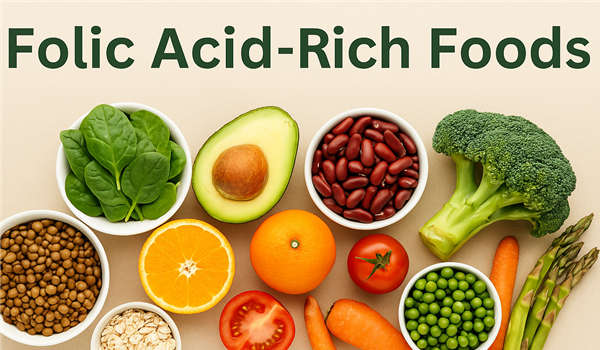Folic Acid food sources

Patient Information Leaflet: Folic Acid and Food Sources
Kensington Medical Centre – Belfast
⸻
What Is Folic Acid?
Folic acid is the man-made form of folate, a type of B vitamin (vitamin B9). It helps your body make healthy red blood cells and supports brain and nerve health. It is especially important before and during pregnancy to help prevent birth defects.
⸻
Why Is Folic Acid Important?
Folic acid is essential for:
• Making DNA and new cells
• Supporting growth and development
• Preventing certain types of anaemia
• Lowering the risk of neural tube defects in babies (like spina bifida)
⸻
Who Needs Folic Acid?
You may need more folic acid if you:
• Are pregnant or trying for a baby
• Are breastfeeding
• Have certain health conditions (e.g., coeliac disease)
• Take medications like anti-epileptics or methotrexate
• Drink a lot of alcohol
• Follow a restrictive diet
Women trying to conceive or in the first 12 weeks of pregnancy are advised to take a 400 microgram (mcg) folic acid supplement daily.
⸻
Top Food Sources of Folate (Natural Form of Folic Acid)
Folate is found naturally in many foods, especially fruits, vegetables, and legumes:
• Leafy greens (spinach, kale, cabbage, romaine lettuce)
• Broccoli, Brussels sprouts, peas
• Oranges, bananas, avocados
• Lentils, chickpeas, black beans
• Asparagus, beetroot
⸻
Fortified Foods with Folic Acid
Some foods have folic acid added to them:
• Fortified breakfast cereals
• White bread and flour products (in the UK, folic acid fortification is increasing)
• Some brands of rice, pasta, or plant-based milks
Check the label to see if folic acid has been added.
⸻
Helpful Tips
• Eat a variety of fruits and vegetables daily
• Include legumes (beans, peas, lentils) in your meals
• Choose fortified cereals or bread if possible
• If pregnant or trying to conceive, take a folic acid supplement as advised by your GP or midwife
⸻
When to See a Doctor
Talk to your GP if you:
• Are pregnant or planning a pregnancy
• Have a health condition that may affect vitamin absorption
• Are on medications that affect folate levels
• Feel unusually tired or have symptoms of anaemia
Your doctor may recommend a blood test or folic acid supplement.
⸻
For more information, visitwww.nhs.uk/conditions/vitamins-and-minerals
This leaflet is for general information only. Please speak to your healthcare provider for advice specific to you.
Medical Disclaimer
The dietary advice and information provided in this leaflet are for general guidance and educational purposes only. They are not intended to replace personalised advice, diagnosis, or treatment from a qualified healthcare professional.
If you have a medical condition, are taking medication, are pregnant or breastfeeding, or have specific dietary needs or food allergies, you should consult your GP, dietitian, or another healthcare provider before making significant changes to your diet.
Following general dietary recommendations without proper medical supervision may not be suitable for everyone and could result in unintended health effects. Always seek individualised medical advice for your personal health circumstances.
Page created: 01 June 2025